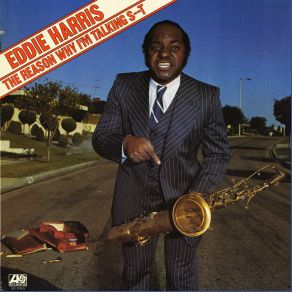The Reason Why I'm Talking S**t
Download links and information about The Reason Why I'm Talking S**t by Eddie Harris. This album was released in 1975 and it belongs to Jazz, Humor genres. It contains 10 tracks with total duration of 47:55 minutes.

|
|
|---|---|
| Artist: | Eddie Harris |
| Release date: | 1975 |
| Genre: | Jazz, Humor |
| Tracks: | 10 |
| Duration: | 47:55 |
| Buy it NOW at: | |
| Buy on iTunes $6.99 | |
Tracks
[Edit]| No. | Title | Length |
|---|---|---|
| 1. | People Getting Ready To Go See Eddie Harris (LP Version) | 8:15 |
| 2. | What I'm Thinking Before I Start Playing (LP Version) | 4:49 |
| 3. | Are There Any Questions (LP Version) | 10:23 |
| 4. | The Reason Why I'm Talking (LP Version) | 0:11 |
| 5. | Th Next Band - Music: Brother Soul Pt. 1 (LP Version) | 2:54 |
| 6. | Ain't S**t Happening - Music: Brother Soul Pt. 2 (LP Version) | 4:04 |
| 7. | Projects and High Rises - Music: Bee Bump (LP Version) | 4:51 |
| 8. | Singing and Straining - Music: The Aftermath (LP Version) | 6:47 |
| 9. | People Enjoying Themselves (LP Version) | 4:02 |
| 10. | Eddie Atlantic (LP Version) | 1:39 |
Details
[Edit]In the '70s it became fashionable for R&B artists to pepper their albums with strands of street talk, all the better to associate their music with the grit and style of the ghetto. Electric saxophonist Eddie Harris took the conceit one step further with The Reason Why I’m Talking S**t, which is essentially a monologue of street talk peppered with a little music. (Harris had a unique bond with Atlantic that allowed him a lot of creative leeway.) Critics hated his extended detour into street soliloquy, but The Reason Why I’m Talking S**t captures Harris’ personality as well as any of his brilliant instrumental records. One could even argue that there's music present in Harris’s speaking voice, even if he’s not talking about anything in particular. His stoned-sounding, slightly ornery patter is spiked with social criticism and blue humor, giving it the ring of great liquor-store jive talk. The bits of music are essentially blues riffs, which is welcome, as Harris was a master of his own twisted version of the blues. In a sense, these monologues are extension of his career as a bluesman—guttural and cryptic, but with a dose of lowdown, tobacco-stained soul.